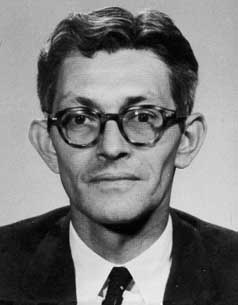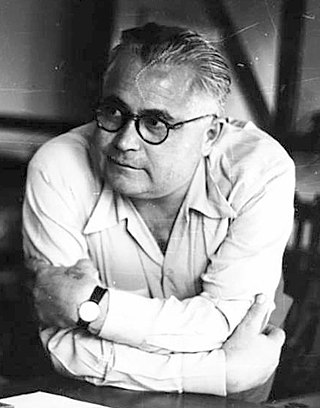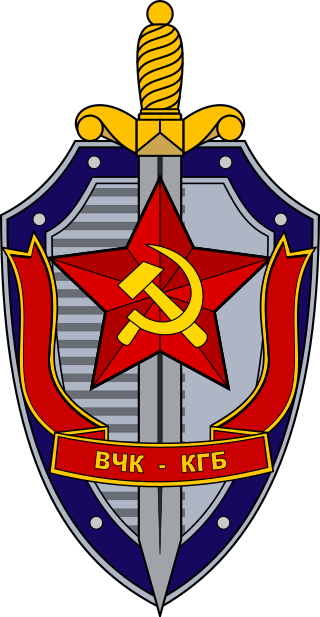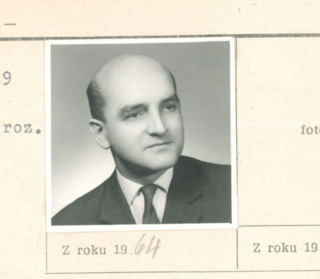
Cold War espionage describes the intelligence gathering activities during the Cold War between the Western allies and the Eastern Bloc. Both relied on a wide variety of military and civilian agencies in this pursuit.

The Cambridge Five was a ring of spies in the United Kingdom that passed information to the Soviet Union during the Second World War and the Cold War and was active from the 1930s until at least the early 1950s. None of the known members were ever prosecuted for spying. The number and membership of the ring emerged slowly, from the 1950s onwards.

In politics, a defector is a person who gives up allegiance to one state in exchange for allegiance to another, changing sides in a way which is considered illegitimate by the first state. More broadly, defection involves abandoning a person, cause, or doctrine to which one is bound by some tie, as of allegiance or duty.

The Petrov Affair was a Cold War spy incident in Australia, concerning the defection of Vladimir Petrov, a KGB officer, from the Soviet embassy in Canberra in 1954. The defection led to a Royal Commission and the resulting controversy contributed to the Australian Labor Party split of 1955.

James Jesus Angleton was an American intelligence operative who served as chief of the counterintelligence department of the Central Intelligence Agency from 1954 to 1975. According to Director of Central Intelligence Richard Helms, Angleton was "recognized as the dominant counterintelligence figure in the non-communist world".

Active measures is a term used to describe political warfare conducted by the Soviet Union and the Russian Federation. The term, which dates back to the 1920s, includes operations such as espionage, propaganda, sabotage and assassination, based on foreign policy objectives of the Soviet and Russian governments. Active measures have continued to be used by the administration of Vladimir Putin.

Oleg Vladimirovich Penkovsky, codenamed Hero and Yoga was a Soviet military intelligence (GRU) colonel during the late 1950s and early 1960s. Penkovsky informed the United States and the United Kingdom about Soviet military secrets, including the appearance and footprint of Soviet intermediate-range ballistic missile installations and the weakness of the Soviet intercontinental ballistic missile (ICBM) program. This information was decisive in allowing the US to recognize that the Soviets were placing missiles in Cuba before most of them were operational. It also gave US President John F. Kennedy, during the Cuban Missile Crisis that followed, valuable information about Soviet weakness that allowed him to face down Soviet leader Nikita Khrushchev and resolve the crisis without a nuclear war.
Oleg Danilovich Kalugin is a former KGB general. He was during a time, head of KGB political operations in the United States and later a critic of the agency. After being convicted of spying for the West in absentia during a trial in Moscow, he remained in the US and was sworn in as a citizen on 4 August 2003.
Anatoliy Mikhaylovich Golitsyn CBE was a Soviet KGB defector and author of two books about the long-term deception strategy of the KGB leadership. He was born in Pyriatyn, USSR. He provided "a wide range of intelligence to the CIA on the operations of most of the 'Lines' (departments) at the Helsinki and other residencies, as well as KGB methods of recruiting and running agents." He became an American citizen by 1984.

Vladimir Mikhaylovich Petrov was a Soviet spy who defected to Australia in 1954 with his wife Evdokia, in what became known as the Petrov Affair.
As early as the 1920s, the Soviet Union, through its GRU, OGPU, NKVD, and KGB intelligence agencies, used Russian and foreign-born nationals, as well as Communists of American origin, to perform espionage activities in the United States, forming various spy rings. Particularly during the 1940s, some of these espionage networks had contact with various U.S. government agencies. These Soviet espionage networks illegally transmitted confidential information to Moscow, such as information on the development of the atomic bomb. Soviet spies also participated in propaganda and disinformation operations, known as active measures, and attempted to sabotage diplomatic relationships between the U.S. and its allies.
Yuri Ivanovich Nosenko was a putative KGB officer who ostensibly defected to the United States in 1964. Controversy arose as to whether or not he was a KGB "plant," and he was held in detention by the CIA for over three years. Eventually, he was deemed a true defector. After his release he became an American citizen and worked as a consultant and lecturer for the CIA.
Jeffrey Talbot Richelson was an American author and academic researcher who studied the process of intelligence gathering and national security. He authored at least thirteen books and many articles about intelligence, and directed the publication of several of the National Security Archive's collections of source documents.
Colonel Sergei Olegovich Tretyakov was a Russian SVR officer, who defected to the United States in October 2000.
Sasha was an alleged Soviet mole in the Central Intelligence Agency during the Cold War.

Yuri Alexandrovich Bezmenov was a Soviet journalist for Novosti Press Agency (APN). In 1970, as a member of the Soviet mission in New Delhi, India, Bezmenov defected to the West and was re-settled in Canada pursuant to an arrangement between American and Canadian security agencies.

The Committee for State Security, abbreviated as KGB, was the main security agency of the Soviet Union from 1954 to 1991. It was the direct successor of preceding Soviet secret police agencies including the Cheka, OGPU, and NKVD. Attached to the Council of Ministers, it was the chief government agency of "union-republican jurisdiction", carrying out internal security, foreign intelligence, counter-intelligence and secret police functions. Similar agencies operated in each of the republics of the Soviet Union aside from the Russian SFSR, where the KGB was headquartered, with many associated ministries, state committees and state commissions.
Russian espionage in the United States has occurred since at least the Cold War, and likely well before. According to the United States government, by 2007 it had reached Cold War levels.

Peter Sergeyevich Deriabin was a KGB officer who defected to the United States in 1954. After his defection, he worked for the Central Intelligence Agency, and wrote several books on the KGB. He died in 1992 at the age of 71.

Lawrence Martin-Bittman, formerly known as Ladislav Bittman, was an American artist, author, and retired professor of disinformation at Boston University. He was best known for his 1983 book, The KGB and Soviet Disinformation: An Insider's View.












